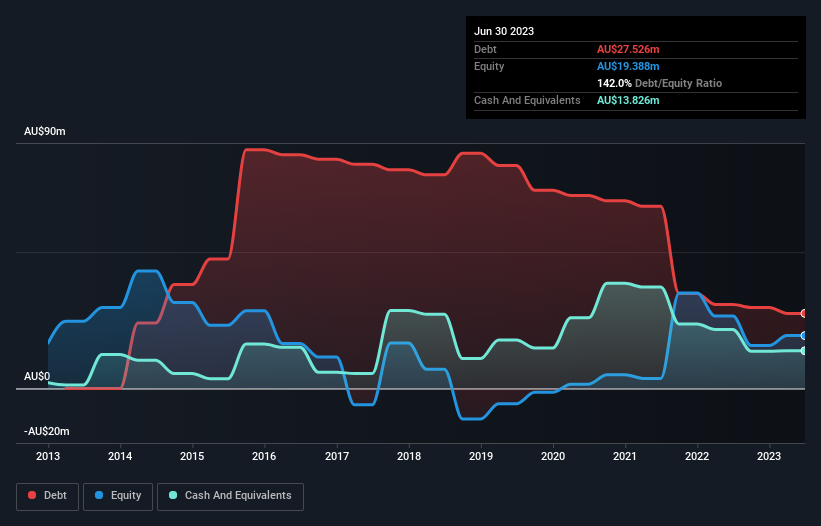Some say volatility, rather than debt, is the best way to think about risk as an investor, but Warren Buffett famously said that 'Volatility is far from synonymous with risk.' It's only natural to consider a company's balance sheet when you examine how risky it is, since debt is often involved when a business collapses. We note that Central Petroleum Limited (ASX:CTP) does have debt on its balance sheet. But the real question is whether this debt is making the company risky.
When Is Debt A Problem?
Generally speaking, debt only becomes a real problem when a company can't easily pay it off, either by raising capital or with its own cash flow. Part and parcel of capitalism is the process of 'creative destruction' where failed businesses are mercilessly liquidated by their bankers. However, a more frequent (but still costly) occurrence is where a company must issue shares at bargain-basement prices, permanently diluting shareholders, just to shore up its balance sheet. Of course, plenty of companies use debt to fund growth, without any negative consequences. When we examine debt levels, we first consider both cash and debt levels, together.
View our latest analysis for Central Petroleum
What Is Central Petroleum's Debt?
You can click the graphic below for the historical numbers, but it shows that Central Petroleum had AU$27.5m of debt in June 2023, down from AU$30.8m, one year before. However, it also had AU$13.8m in cash, and so its net debt is AU$13.7m.

How Strong Is Central Petroleum's Balance Sheet?
Zooming in on the latest balance sheet data, we can see that Central Petroleum had liabilities of AU$16.9m due within 12 months and liabilities of AU$61.8m due beyond that. On the other hand, it had cash of AU$13.8m and AU$5.31m worth of receivables due within a year. So its liabilities total AU$59.6m more than the combination of its cash and short-term receivables.
This deficit casts a shadow over the AU$32.6m company, like a colossus towering over mere mortals. So we definitely think shareholders need to watch this one closely. At the end of the day, Central Petroleum would probably need a major re-capitalization if its creditors were to demand repayment. When analysing debt levels, the balance sheet is the obvious place to start. But you can't view debt in total isolation; since Central Petroleum will need earnings to service that debt. So when considering debt, it's definitely worth looking at the earnings trend. Click here for an interactive snapshot.
Over 12 months, Central Petroleum made a loss at the EBIT level, and saw its revenue drop to AU$39m, which is a fall of 6.9%. We would much prefer see growth.
Caveat Emptor
Importantly, Central Petroleum had an earnings before interest and tax (EBIT) loss over the last year. Its EBIT loss was a whopping AU$6.5m. Considering that alongside the liabilities mentioned above make us nervous about the company. It would need to improve its operations quickly for us to be interested in it. Not least because it burned through AU$4.9m in negative free cash flow over the last year. So suffice it to say we consider the stock to be risky. When analysing debt levels, the balance sheet is the obvious place to start. However, not all investment risk resides within the balance sheet - far from it. For example - Central Petroleum has 2 warning signs we think you should be aware of.
When all is said and done, sometimes its easier to focus on companies that don't even need debt. Readers can access a list of growth stocks with zero net debt 100% free, right now.
New: AI Stock Screener & Alerts
Our new AI Stock Screener scans the market every day to uncover opportunities.
• Dividend Powerhouses (3%+ Yield)
• Undervalued Small Caps with Insider Buying
• High growth Tech and AI Companies
Or build your own from over 50 metrics.
Have feedback on this article? Concerned about the content? Get in touch with us directly. Alternatively, email editorial-team (at) simplywallst.com.
This article by Simply Wall St is general in nature. We provide commentary based on historical data and analyst forecasts only using an unbiased methodology and our articles are not intended to be financial advice. It does not constitute a recommendation to buy or sell any stock, and does not take account of your objectives, or your financial situation. We aim to bring you long-term focused analysis driven by fundamental data. Note that our analysis may not factor in the latest price-sensitive company announcements or qualitative material. Simply Wall St has no position in any stocks mentioned.
About ASX:CTP
Central Petroleum
Engages in the development, production, processing, and marketing of hydrocarbons, including natural gas, and crude oil and condensate in Australia.
Undervalued with excellent balance sheet.
Similar Companies
Market Insights
Community Narratives



